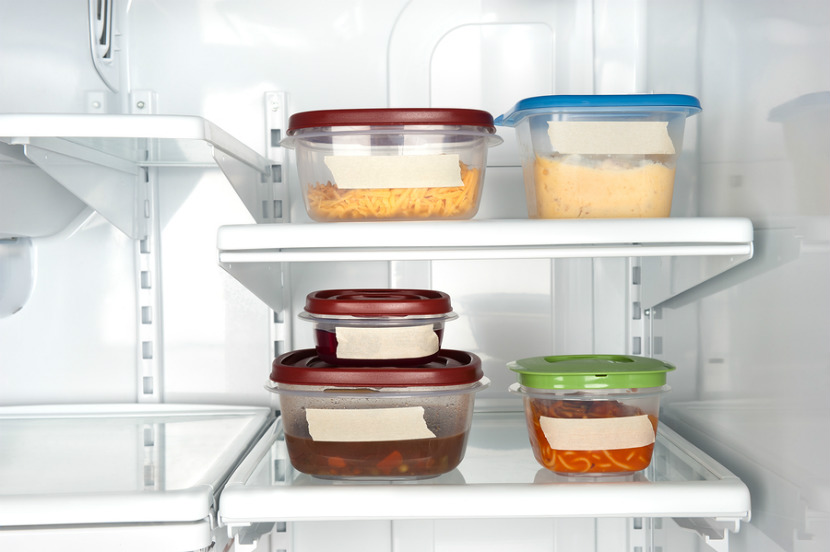 Many people enjoy eating leftovers from last night’s dinner or from a big restaurant meal. But, leftovers do not last forever. Here are some tips for safely storing the extra portions for quick and nutritious meals.
Many people enjoy eating leftovers from last night’s dinner or from a big restaurant meal. But, leftovers do not last forever. Here are some tips for safely storing the extra portions for quick and nutritious meals.
What should I do with my leftovers?
Leftovers are foods that you do not finish at your meal, but you eat another time. Saving leftovers helps to avoid wasting food, saves money and makes quick future meals.
Some leftovers can be mixed with additional ingredients to make a whole new meal. This works best with single items such as cooked vegetables, potatoes, chicken or fish. For example:
- Toss vegetables into your omelette, sandwich or pasta
- Mash potatoes as Shepherd’s pie topping
- Add chicken to low-sodium broth with noodles and carrots
- Combine fish with low-fat mayonnaise and celery and use in a sandwich.
There are many exciting ways to make tonight’s dinner ingredients into a totally new meal tomorrow. Here are some more ideas.
How can I safely store my leftovers?
If you prepare large batches of foods like casseroles, lasagne and stew, you can store some in the fridge to eat over the next few days. You can freeze the rest. Find out more about food handling here.
Here’s how to cool your leftovers safely:
- Wait for hot food to stop steaming. Put food in a shallow dish so it cools more quickly.
- Once cooled, divide leftovers into single serving amounts so you can take what you need when you feel hungry.
Storing food in the fridge:
- Store your leftovers in covered containers with lids that snap shut. Or, use bowls covered with cling wrap or aluminum foil. Wrap foods tightly so that they will not dry out.
- Label each food with the name and date you made it.
- Most leftovers can stay in the fridge for two to three days.
Storing food in the freezer:
- Use containers that are specifically made for freezer use.
- Or, wrap food in aluminum foil and place in re-sealable plastic bags.
- Label each food with the name and date you made it.
- Most leftovers can stay in the freezer for two to three months.
Tip: Keep foods out of the danger zone where bacteria grow. Foods need to be kept:
- Cold: Below 4°C (40°F) or
- Hot: Over 60°C (140°F)
Use a food thermometer to make sure your food is safe. You can buy a food thermometer at any department store or kitchenware shop.
How should I reheat my leftovers?
Thaw frozen foods in the fridge or use the “defrost” setting on your microwave. Then, you can safely reheat leftovers in the oven, microwave or on a stove top. Do not reheat leftovers in a slow cooker.
Oven: Use an oven-proof container. Cover food with a lid or foil so it does not dry out.
Stovetop: If reheating gravy, soup or sauce: bring to a full rolling boil while stirring.
Microwave: Use only containers made for microwave use. Loosen lids to let the steam escape. Stop the microwave midway through reheating and stir the food so that the heat is evenly distributed.
Whichever method you use, leftovers need to be reheated to 74° C (165ºF). Use a food thermometer to make sure your food is safe. You can buy a food thermometer at any department store or kitchenware shop.
What if I’m not sure if leftovers are safe to eat?
When in doubt, throw it out. Never rely on how a food smells, looks or tastes to decide if it has gone bad. Food that has been stored for too long can spoil and make you sick even if it looks or smells okay.
Can I re-freeze leftovers that have already been reheated once?
Do not re-freeze foods that you've defrosted or warmed in the microwave. If you thawed your leftovers in the fridge but have not reheated them, you can re-freeze the unused portion within three to four days of being left in the fridge. However, refreezing foods may result in a loss of taste, texture and appearance.
Bottom line
Leftovers are a great way to save money and get creative in the kitchen. Be sure to cool, store and re-heat foods safely to get the most out of your leftovers.
Last Update – March 1, 2023